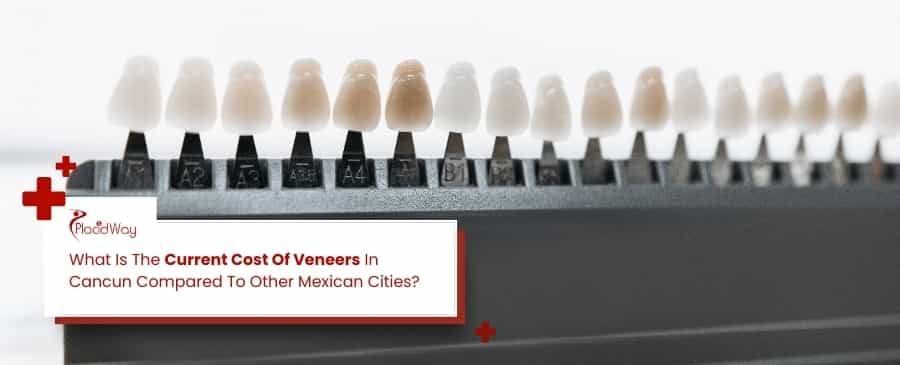Why Cancun Is a Popular Choice for Dental Veneers

We'll explore the typical price ranges you can expect for a smile makeover, offering a clear comparison with other popular dental tourism hubs like Tijuana, Mexico City, and Guadalajara. You'll discover that while Cancun might be renowned for its luxurious resorts and stunning beaches, its dental clinics also offer competitive pricing, often blending high-quality care with an appealing vacation opportunity.
We'll break down the factors that influence the cost, discuss the types of veneers available, and help you understand why choosing Mexico for your dental needs could be a brilliant decision. Our goal is to equip you with all the essential information needed to make an informed choice, ensuring your journey to a brighter smile is both affordable and satisfying.
What is the Current Cost of Veneers in Cancun?
For porcelain veneers, which are known for their durability and aesthetic appeal, you can expect to pay anywhere from $400 to $800 USD per tooth. This range accounts for various factors, including the specific dental clinic, the dentist's experience, the brand of porcelain used, and the complexity of your individual case.
On the other hand, if you're exploring more budget-friendly options, composite veneers are available at a lower price point. These typically cost between $200 and $400 USD per tooth in Cancun.
While composite veneers offer a faster application process and are reversible, they may not last as long as porcelain and can be more susceptible to staining. Both options provide significant cosmetic improvements, allowing you to choose based on your budget and desired longevity.
How Does the Cost of Veneers in Cancun Compare to Tijuana?
In Tijuana, porcelain veneers typically range from $300 to $700 per tooth, making it a very attractive option for those traveling from California and neighboring states. Composite veneers in Tijuana are often priced between $150 and $350 per tooth.
The slight difference often comes down to the overall economic environment and the target clientele. Cancun is a premium tourist destination, which can lead to slightly higher operational costs for dental clinics compared to a border city like Tijuana.
Patients choosing Cancun often combine their dental trip with a full vacation experience, while those choosing Tijuana might prioritize quick in-and-out trips. The quality of care in both locations can be excellent, with many clinics boasting state-of-the-art technology and internationally trained dentists.
Is the Cost of Veneers in Cancun Different from Mexico City?
Mexico City, as the country's bustling capital and a major metropolis, offers a vast array of dental clinics, from high-end specialized practices to more general dentistry offices. The competition among dental providers in Mexico City can sometimes drive prices slightly lower than in a resort town like Cancun.
What Types of Veneers Are Available in Cancun and Their Costs?
When you visit a dental clinic in Cancun for a smile makeover, you'll generally be presented with two main types of veneers, each with its own advantages and cost implications. Understanding the differences will help you choose the best option for your needs and budget.
Porcelain Veneers
- Description: These are custom-made, thin shells of medical-grade porcelain that are bonded to the front surface of your teeth. They are renowned for their strength, stain resistance, and ability to mimic the light-reflecting properties of natural tooth enamel, providing an incredibly lifelike appearance.
- Process: Porcelain veneers typically require two or more appointments. The first involves preparation (removing a tiny amount of enamel) and taking impressions. The second involves bonding the custom-fabricated veneers.
- Cost in Cancun: Generally between $400 - $800 USD per tooth.
- Lifespan: With proper care, porcelain veneers can last 10-15 years, and even longer.
- Benefits: Excellent aesthetics, highly durable, stain-resistant, and long-lasting.
Composite Veneers (Direct Veneers)
- Description: Made from a tooth-colored composite resin material, these veneers are applied directly to the tooth surface and sculpted by the dentist. They are a more immediate solution compared to porcelain.
- Process: Often completed in a single visit, where the dentist applies the resin, shapes it, and then hardens it with a special light.
- Cost in Cancun: Typically between $200 - $400 USD per tooth.
- Lifespan: Generally last 5-7 years before needing repair or replacement.
- Benefits: More affordable, quicker to apply (often one visit), less tooth enamel removal, and can be easily repaired.
Considering a smile transformation in Mexico? Explore PlacidWay for trusted solutions in medical tourism, connecting you with top-tier healthcare services and expert advice for your dental needs.


.png)




.png)
.png)

.png)






Share this listing